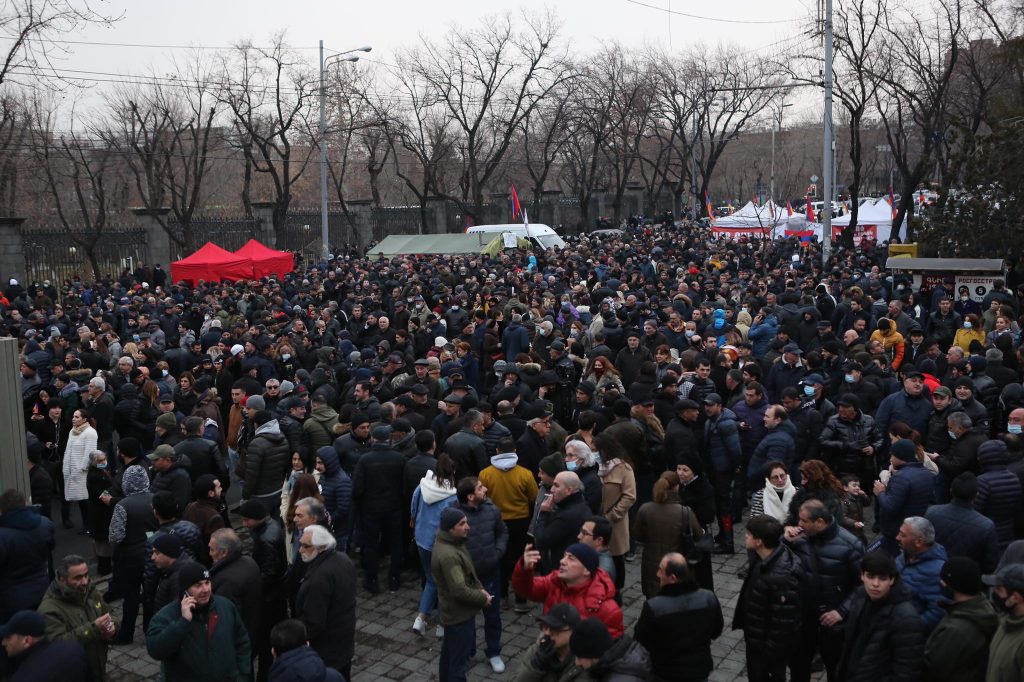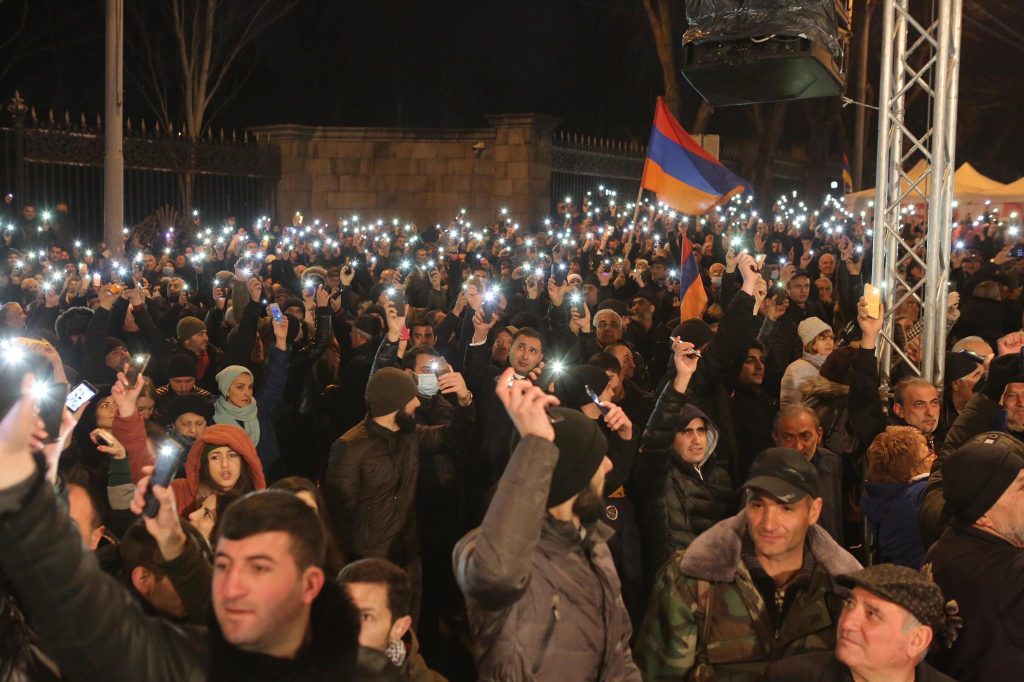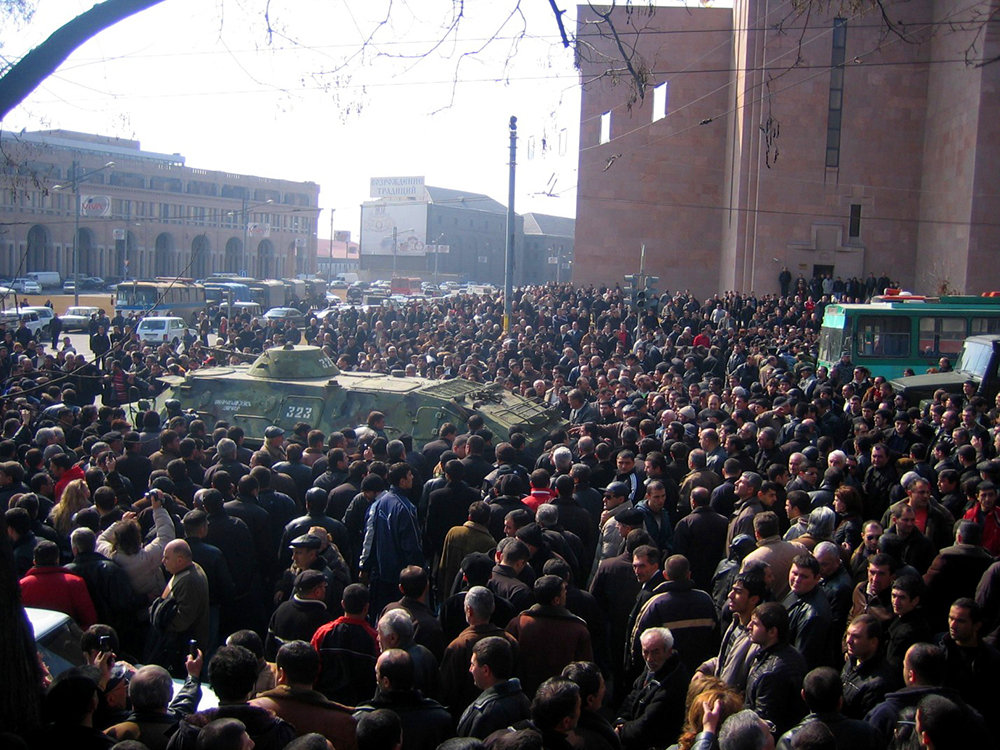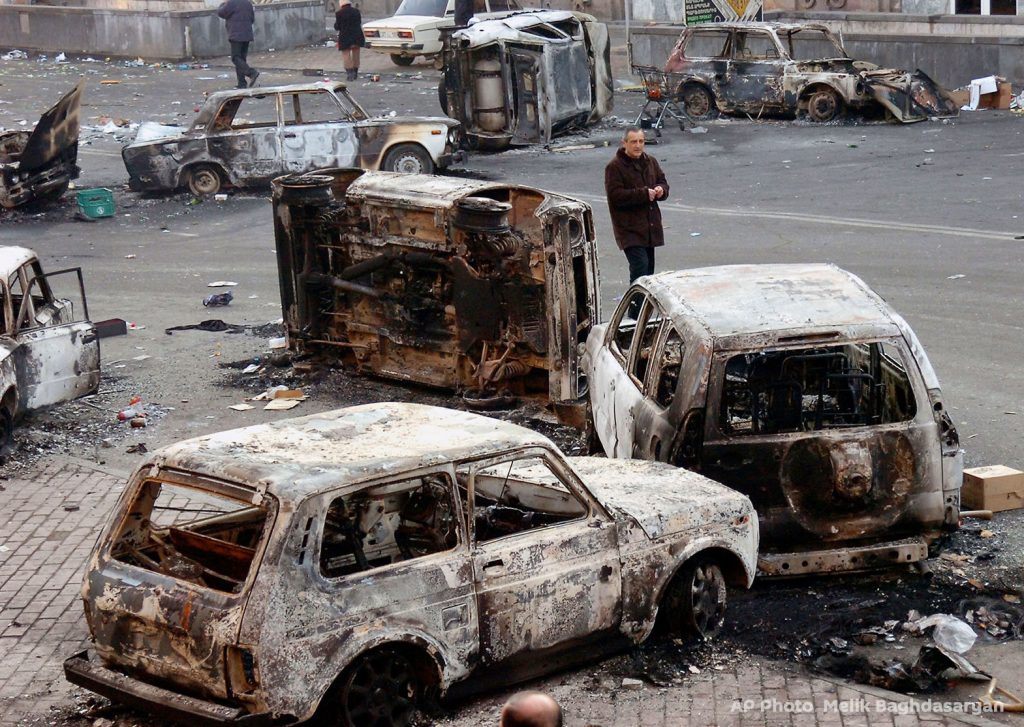Parallel opposition and government rallies in Yerevan
Rallies were held in Yerevan of both the opposition and the authorities last night on March 2.
The dialogue between opposition parties demanding the resignation of the Prime Minister of Armenia Nikol Pashinyan and the authorities is failing.
The two sides ‘communicate’ more through statements and keynote speeches at rallies.
This time, the formal reason for the protests was the tragic events of March 1, 2008, when 10 people died during the dispersal of a demonstration of those who did not agree with the results of the presidential elections at the time.
A rally of thousands of supporters of the current authorities led by the prime minister was held in the main square of Yerevan.
During his speech, Nikol Pashinyan announced the need to hold snap parliamentary elections to overcome the political crisis that began after the cessation of hostilities in Karabakh in the fall of 2020. Pashinyan says the residents of the country should decide whether he should remain in power or resign, as the opposition has been demanding for months.
The government also plans to hold a referendum in October this year. The issue of the ‘expediency of Armenia’s transition from a parliamentary form of government to a semi-presidential’ one will be put to a nationwide vote.
At that time, an opposition rally was taking place on Baghramyan Avenue, just a few kilometers away.
To prevent possible run-ins, the police blocked the entrance to the avenue.
- Unrest in Armenia: thousands rally at three separate protests in Yerevan
- On the brink of civil war? Armenian political crisis continues
- ‘Armenia without Nikol’: opposition resumes protests in Yerevan
PM-backed rally
The prime minister’s rally began with the Armenian anthem and two minutes of silence. The protesters first honored the memory of those killed during the second Karabakh war in autumn 2020, then the victims of the events of March 1, 2008.
At the beginning of his speech, Nikol Pashinyan apologized for the government’s mistakes. The prime minister claimed that the reason for the mistakes was that ‘the authorities enjoy the support of the people’:
“This concerns our government, concerns me personally. And I want to ask all of you, all citizens of Armenia, all Armenians of the Diaspora, all citizens of Artsakh – I want to ask forgiveness for all the mistakes I made. We were so loved that while trying to justify the people’s love and our love for the people and the homeland, we wanted to do everything exactly and perfectly.”
The most interesting news was that about a possible constitutional referendum:
“The Constitution, which was adopted in 2015 and came into force in 2018, revealed a huge number of shortcomings for us, including that it [contains] risks for creating crisis situations. We believe that the transition to a semi-presidential form will be one of the best options.”

One of the main topics of the prime minister’s speech was the statement of the General Staff of the Armed Forces, in which the entire leadership came forward with a demand for the resignation of Nikol Pashinyan. The head of the Cabinet called this statement the result of the influence on the generals by the previous government. According to him, former Armenian President Serzh Sargsyan was among those who tried to persuade the generals.
The prime minister said that the people who led the army against their people in March 2008 are now trying to repeat it again:
“I want to say that the statement of the General Staff of the Armed Forces is absolutely illegal, since the constitution clearly establishes the neutrality of the armed forces in political matters. The Chief of the General Staff adheres to a clearly expressed political orientation, and thus violates all the rules and the constitution.”
Pashinyan insists that the head of the General Staff Onik Gasparyan resign, and the rest of the generals who signed the statement return to their duties. There will be no “vendetta” in their regard, according to Pashinyan.
After the rally of supporters of the authorities, a march took place, which was accompanied by armored vehicles and dozens of “red berets”.

Opposition rally
Former Defense Minister Seyran Ohanyan addressed the opposition rally.
The ex-minister supported the army and said that the prime minister has no right to either prosecute or dismiss the military:
“Was the army, as a legitimate structure, supposed to silently observe how our lands are given in pieces to the Turks and Azerbaijanis? No. The army did the right thing.”
The former minister believes that the army has shown political neutrality, it does not interfere in rallies, and the military expresses its point of view as citizens of the country.

The former head of the General Staff of the Armed Forces of Armenia, Yuri Khachaturov, also took part in the opposition rally:
“Our entire Armenian army is behind us. […] We must quickly bring the matter to an end [talking about the resignation of the prime minister]. Even Aliyev and Erdogan are jittery. They are concerned about the situation in Armenia, because they remember that the Armenian army beat and will beat them. We will return it all.”
MP from the opposition Prosperous Armenia faction Mikael Melkumyan stated during his speech that the change of power should take place in a constitutional way:
“And for this it is necessary to put on the agenda the issue of lifting martial law and discuss the current situation.”

Politicians about the events of March 1, 2008
In his address on the occasion of the anniversary of the tragic events of March 1, President Armen Sargsyan stated that the political struggle should not go beyond the law, should not lead to shocks and instability, contradictions should not turn into intolerance and mutual hatred, moreover, become the cause of confrontation and split:
“I call again for tolerance and solidarity. We need this. Today it is especially important for the state and the people.”
Speaker of the National Assembly Ararat Mirzoyan wrote on Facebook that 10 citizens who died during those events “dreamed of living in a free, democratic and happy Armenia. As a result of the use of force on the basis of an illegal order on March 1, the development of Armenia along the democratic path was stopped for 10 years.”
According to Mirzoyan, these days, when high-ranking military officials tried to intervene in political processes, such a situation cannot be allowed to happen again.
Deputy Prime Minister Tigran Avinyan believes that the 2018 velvet revolution ruled out such a possibility:
“Thirteen years ago, our state and society experienced a strong shock when the protest of our compatriots, who challenged the official election results, was met with a point-blank shot.
Through the revolution, the Armenian society has decisively demonstrated that there will no longer be “March 1” in Armenia, and that an unarmed citizen holding a peaceful action will not be shot. ”
What happened on March 1, 2008
Presidential elections were held in Armenia in 2018. Robert Kocharian was still the current president at that time. Although, according to the Central Election Commission, a new president, Serzh Sargsyan, has already been elected, he has not yet taken office.
After the February 18, 2008 elections, supporters of the political bloc headed by the first President of Armenia Levon Ter-Petrosyan demanded to reconsider the election results. They claimed that Ter-Petrosyan had won. Until March 1, thousands of people did not leave the square, participating in demonstrations around the clock.
On March 1, military weapons were used during the dispersal of the demonstration, killing ten people, including two police officers.

The leader of the velvet revolution, Nikol Pashinyan, who has headed the government since 2018, advocated solving the March 1 case long before taking office.
In the 2008 presidential elections, Nikol Pashinyan represented the interests of presidential candidate Levon Ter-Petrosyan. After the tragic events of March 1, the opposition figure went underground for a year and four months due to accusations of organizing mass riots.
On July 1, 2010, he voluntarily appeared in the prosecutor’s office, was arrested and sentenced to seven years. One year and 11 months later, he fell under an amnesty timed to coincide with the 20th anniversary of Armenia’s independence. The opposition claims that the authorities were forced to take this step under pressure from international structures.
After the “velvet revolution” and Nikol Pashinyan’s rise to power in 2018, the trial in this case sharply intensified in Armenia. The main accused in this regard is ex-President Robert Kocharian, who has openly and more than once stated that this case in his regard is a political order.



















